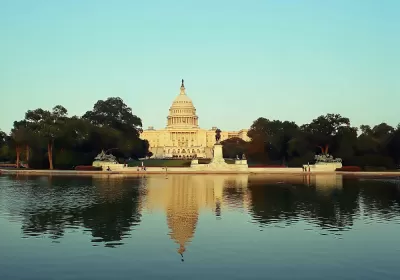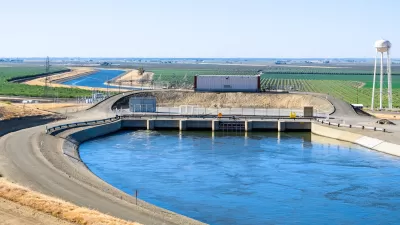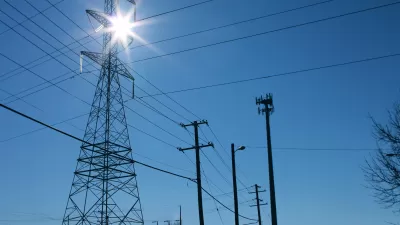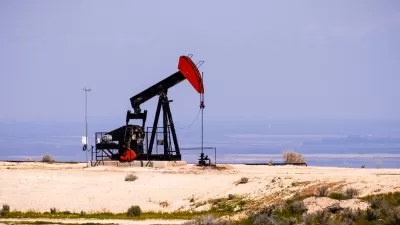You'd think the passage of the $1.2 trillion bipartisan infrastructure act would convey bragging rights for Democratic congress members facing competitive midterm elections today. Ironically, Republicans who opposed the bill are taking credit.

Readers are undoubtedly familiar with the top issues facing voters on Election Day: the economy and inflation, crime, abortion access, threats to democracy, and immigration among them. Infrastructure is rarely, if ever mentioned.
Yet, “Democrats facing voters on Tuesday can boast of a landmark achievement from their two years of running Washington — a $1.2 trillion infrastructure law that promises to rebuild the nation’s roads and bridges, expand broadband service, put more electric vehicles on the road and provide millions of Americans with cleaner drinking water,” write Tanya Snyder, Jordan Wolman, Annie Snider, John Hendel and Eleanor Mueller for POLITICO two days before Election Day.
Biden signed the infrastructure law on Nov. 15, 2021 [related Planetizen post], after it passed with broad bipartisan support in the Senate and just 13 GOP votes in the House. The measure, H.R. 3684 (117), was one of a series of big-spending legislative packages that have marked his administration — including a $1.9 trillion Covid relief bill [American Rescue Plan Act], $52 billion in semiconductor and research subsidies and $300 billion for climate and energy initiatives [Inflation Reduction Act].
Polls show most voters have no idea Congress even passed the legislation — let alone that it’s already set to provide tens of billions of dollars to projects such as rail tunnels under the Hudson River, Everglades restoration work in Florida or a bridge replacement in Tennessee. Meanwhile, Republican lawmakers who opposed the bill have been quick to offer praise and claim credit when their local projects get a share of the cash.
A major reason for the lack of attention to the bill's passage is the time it takes to break ground on specific projects. Furthermore, the authors note that “[m]any of the spending decisions will rest with Republican governors who oppose Biden’s push to use much of the money for projects that counteract climate change or redress the legacies of racial discrimination.”
To date, Washington has pledged just $38 billion of the law’s $1.2 trillion to thousands of individual projects, including $69 million to reconfigure the shoreline at the Port of Alaska in Anchorage and a $25 million bridge replacement in Chattanooga, Tenn.
Partisan Divisions
“One partisan flashpoint was a December 2021 memo from the Federal Highway Administration that pressed state transportation projects [pdf] to avoid spending their new infrastructure money on highway widening, saying they should make it a priority to repair and upgrade existing roads instead,” write Snyder, Wolman, Snider, Hendel and Mueller.
The administration argued this approach will make transportation safer while reducing greenhouse gas emissions.
Sixteen GOP governors lambasted that effort in a letter to Biden as “a clear example of federal overreach [pdf],” noting that the guidance includes restrictions that were intentionally left out of the final bill.
Transportation Secretary Pete Buttigieg later admitted under fire from Republicans in congressional hearings that the memo’s suggestions weren’t binding.
As for Congressional Republicans who voted against the bill's passage taking credit for infrastructure projects in their districts, they assert “that once the law was enacted and the grant money was available, it was their responsibility to advocate for their communities to get their share.”
Hat tip to POLITICO Playbook.
FULL STORY: Biden won on infrastructure. Democrats are struggling to get voters to care.

Study: Maui’s Plan to Convert Vacation Rentals to Long-Term Housing Could Cause Nearly $1 Billion Economic Loss
The plan would reduce visitor accommodation by 25,% resulting in 1,900 jobs lost.

North Texas Transit Leaders Tout Benefits of TOD for Growing Region
At a summit focused on transit-oriented development, policymakers discussed how North Texas’ expanded light rail system can serve as a tool for economic growth.

Using Old Oil and Gas Wells for Green Energy Storage
Penn State researchers have found that repurposing abandoned oil and gas wells for geothermal-assisted compressed-air energy storage can boost efficiency, reduce environmental risks, and support clean energy and job transitions.

Private Donations Propel Early Restoration of Palisades Playground
Los Angeles has secured over $1.3 million in private funding to restore the Pacific Palisades playground months ahead of schedule, creating a modern, accessible space that supports community healing after recent wildfires.

From Blight to Benefit: Early Results From California’s Equitable Cleanup Program
The Equitable Community Revitalization Grant (ECRG) program is reshaping brownfield redevelopment by prioritizing projects in low-income and environmental justice communities, emphasizing equity, transparency, and community benefits.

Planting Relief: Tackling Las Vegas Heat One Tree at a Time
Nevada Plants, a Las Vegas-based nonprofit, is combating the city’s extreme urban heat by giving away trees to residents in underserved neighborhoods, promoting shade, sustainability, and community health.
Urban Design for Planners 1: Software Tools
This six-course series explores essential urban design concepts using open source software and equips planners with the tools they need to participate fully in the urban design process.
Planning for Universal Design
Learn the tools for implementing Universal Design in planning regulations.
Ascent Environmental
Borough of Carlisle
Institute for Housing and Urban Development Studies (IHS)
City of Grandview
Harvard GSD Executive Education
Toledo-Lucas County Plan Commissions
Salt Lake City
NYU Wagner Graduate School of Public Service





























